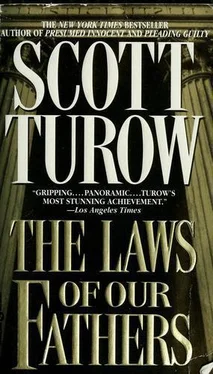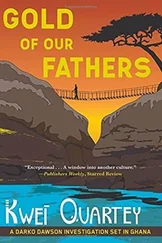Scott Turow - The Laws of our Fathers
Здесь есть возможность читать онлайн «Scott Turow - The Laws of our Fathers» весь текст электронной книги совершенно бесплатно (целиком полную версию без сокращений). В некоторых случаях можно слушать аудио, скачать через торрент в формате fb2 и присутствует краткое содержание. Жанр: Криминальный детектив, на английском языке. Описание произведения, (предисловие) а так же отзывы посетителей доступны на портале библиотеки ЛибКат.
- Название:The Laws of our Fathers
- Автор:
- Жанр:
- Год:неизвестен
- ISBN:нет данных
- Рейтинг книги:5 / 5. Голосов: 1
-
Избранное:Добавить в избранное
- Отзывы:
-
Ваша оценка:
- 100
- 1
- 2
- 3
- 4
- 5
The Laws of our Fathers: краткое содержание, описание и аннотация
Предлагаем к чтению аннотацию, описание, краткое содержание или предисловие (зависит от того, что написал сам автор книги «The Laws of our Fathers»). Если вы не нашли необходимую информацию о книге — напишите в комментариях, мы постараемся отыскать её.
The Laws of our Fathers — читать онлайн бесплатно полную книгу (весь текст) целиком
Ниже представлен текст книги, разбитый по страницам. Система сохранения места последней прочитанной страницы, позволяет с удобством читать онлайн бесплатно книгу «The Laws of our Fathers», без необходимости каждый раз заново искать на чём Вы остановились. Поставьте закладку, и сможете в любой момент перейти на страницу, на которой закончили чтение.
Интервал:
Закладка:
But does that mean I have to say yes to a bench trial? The older judges always tell you not to rush. They have a dozen sayings:
'There's no stopwatch on the court reporter's transcript.' 'The court of appeals won't reverse for delay of game.' I find myself staring down into the open pages of my bench book. It's an oversized volume, with a red clothbound spine, heavy stock pages lined in green, feathered edges, and a cover clad in rough black Moroccan leather. On the spine, my name has been impressed in gold. In the quaintest of courthouse customs, the book was presented to me when I took the bench, a judge's diary, the place for private notes about each trial. The pages before me are blank, as undetermined as I am.
Decide, I tell myself, as I so often do. In this job, deliberation is respected. Indecision is not. My work, in the end, is simply that, deciding, saying yes or no. But it's hard labor for the natively ambivalent. There's no other job I know of that more reliably reveals the shortcomings of a personality than being a judge. The pettish grow even more short-tempered; the silently injured can become power-mad or abusive. For someone who can spend a tortured moment before the closet, picking a dress, this work can be maddening. I'm supposed to let the conclusions roll forth as if they were natural and predetermined, as if it were as easy as naming my favorite color (blue). But I wait now, as I often do, silently hoping that some alternative, some forceful thought or feeling, will expose itself. The years roll on and life seems like this more and more, that choices don't really exist in the way I thought they would when I was a child and expected the regal power of adulthood to provide clarity and insight. Instead, choice and need seem indistinguishable. In the end, I find myself clutched by the resentment, which I still think of as peculiarly female, of being so often the victim of circumstance and time.
'Mr Eddgar,' I say and call him forward. I explain to Nile what it means to have a bench trial, that I alone will decide whether or not he is guilty, and ask if he's willing to give up his right to a jury-
'That's what we want,' he replies. Perhaps because it's the first sound of Nile's voice since the start of these proceedings, the remark takes me aback. What does that mean? 'What we want'? He's going to get it, notwithstanding.
'Trial shall be to the court. What are your thoughts on scheduling, gentlemen?' After discussion, Hobie and Molto decide they're better off spending the balance of the morning on stipulations, hoping to agree about certain facts now that there's no need to educate – or fool – a jury. 'If you care to make opening statements, I will hear them immediately after my bond call at 2 p.m.' I point to Marietta, seated below me on the first tier of the bench, and tell her to call a recess.
The courtroom springs to life with an urgent buzz. A bench trial! The court buffs and cops and reporters mingle, exchanging speculations as they head into the corridor. I converse with Marietta about discharging the seventy-five citizens who've been summoned as prospective jurors. Then I gather the bench book and the court file. A day at a time, I tell myself. Weary already, I sink down the stairs.
'Judge? Can I talk to you?'
When I look back it's Seth Weissman, hunched somewhat timorously beside the front corner of the bench. A little squeeze of something tightens my heart, but I'm struck principally by the way he's addressed me. It must have been less peculiar to be a judge back in the Age of Manners, or even thirty years ago, when the lines of authority were more absolute. These days the attendant reverence can seem downright inane. People who were grown-ups when I was a child stand a few feet below me and, at their most casual, address me as 'Judge.' To hear it from the first man outside my family who ever said 'I love you' raises the implausibility of these customs to dizzying heights.
'Seth,' I say. 'How are you?'
Something – a sense of the momentousness of time – swims through his expression.
'Bald,' he answers, summoning in one word the boy I knew: funny, vulnerable, always willing to accept a helping hand.
I try a straight face that doesn't last. 'Is my line "I hadn't noticed"?'
'I'd settle for "It's nice to see you." ' 'It is, Seth.'
'Good,' he says, then hangs midair. ‘I just wanted to apologize,' he says. 'You know, the acoustics were kind of startling.'
I dispense a forgiving backhand wave. He asks how I am.
'Busy. Crazy with my life like everybody else. But okay. And you, Seth? I can only imagine how proud you are of your success.'
He worms around, an aw-shucks routine meant to suggest it's all beyond him. More than ten years ago I first saw a column by Michael Frain. I was sure the name was a coincidence. The Michael I knew could never have become a master of the quick shot or the snappy bon mot. Then a year later I saw a picture, which was unmistakably Seth's. What in the world? I thought. How did this happen? Questions whose answers I still want to know.
At times since, I've looked at the somewhat whimsical photo (conveniently cropped just above the brow) and the accompanying columns, wondering about this man with whom I parted company with the usual tangled feelings, but no deepening regrets. I liked Seth. I lost him. There were half a dozen others about whom the same might be said, even, if I'm feeling mellow, Charlie. Sometimes – especially when something he writes has struck me funny – I have recalled distinctly the droll delivery of Seth's somewhat monotonous Midwestern voice, in which the glottal Fs rasp in a minor speech impediment. At other moments, he can disappoint me. Always the sucker for easy laughs, he is sometimes too quick to flay targets already tattered by public scorn, and he occasionally displays certain ungenerous retrograde political opinions, a former leftist too eager to show he's wised up. At his best, though, he can be quick and penetrating, putting down a line or two that seems to sum up all the world's sadness. Even so, these commonplaces often perplex me. What could have brought that on? I'll wonder. Or even worse, I'll imagine all of it was there in the sweet, funny boy who whirled through my life, and that I overlooked it because I was so busy seeking within myself. Was it? How did I miss it? Where was it hidden? Those questions also linger.
'You were always funny,' I tell him. 'I didn't realize you were wise.'
'You can create a lot of illusions in eight hundred words.' 'Oh, you're very good, Seth. Everybody likes what you write. My minute clerk acts as if I used to hang out with Mick Jagger.' 'Wait till she hears me sing.'
I actually laugh. 'Still a smart guy,' I say and he seems pleased to find his character so well remembered.
'I've always told Lucy, that's what I want on my gravestone: "Now what, smartass?"'
With that, the rear door bangs open and Marietta bulls a few steps into the courtroom. She's headed for the bench with a sheaf of draft orders when she catches sight of us and goes completely still. She turns heel abruptly, leaving the courtroom as it was, empty and hushed.
'So I take it I can look forward to a column about all of this?' I ask. My index finger circles toward the courtroom.
'' 'The Big Chill Meets Perry Mason"?' He laughs at the notion. 'Maybe. It's an amazing curiosity, isn't it? Coincidence. Whatever you'd call it. Everybody together? I had to see it.'
‘I take it from the way you were giving Hobie the business, you're still close with him?'
He laughs about that, too. That's how Seth heard about the case, I suspect, from Hobie, but now that I'm asking questions about the defense lawyer I realize I've probably already let this conversation go further than I should. I offer my hand and tell Seth I'm on my way.
Читать дальшеИнтервал:
Закладка:
Похожие книги на «The Laws of our Fathers»
Представляем Вашему вниманию похожие книги на «The Laws of our Fathers» списком для выбора. Мы отобрали схожую по названию и смыслу литературу в надежде предоставить читателям больше вариантов отыскать новые, интересные, ещё непрочитанные произведения.
Обсуждение, отзывы о книге «The Laws of our Fathers» и просто собственные мнения читателей. Оставьте ваши комментарии, напишите, что Вы думаете о произведении, его смысле или главных героях. Укажите что конкретно понравилось, а что нет, и почему Вы так считаете.












